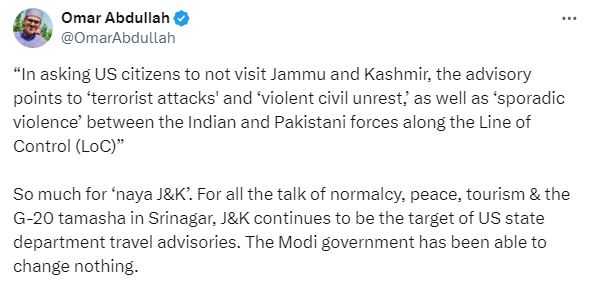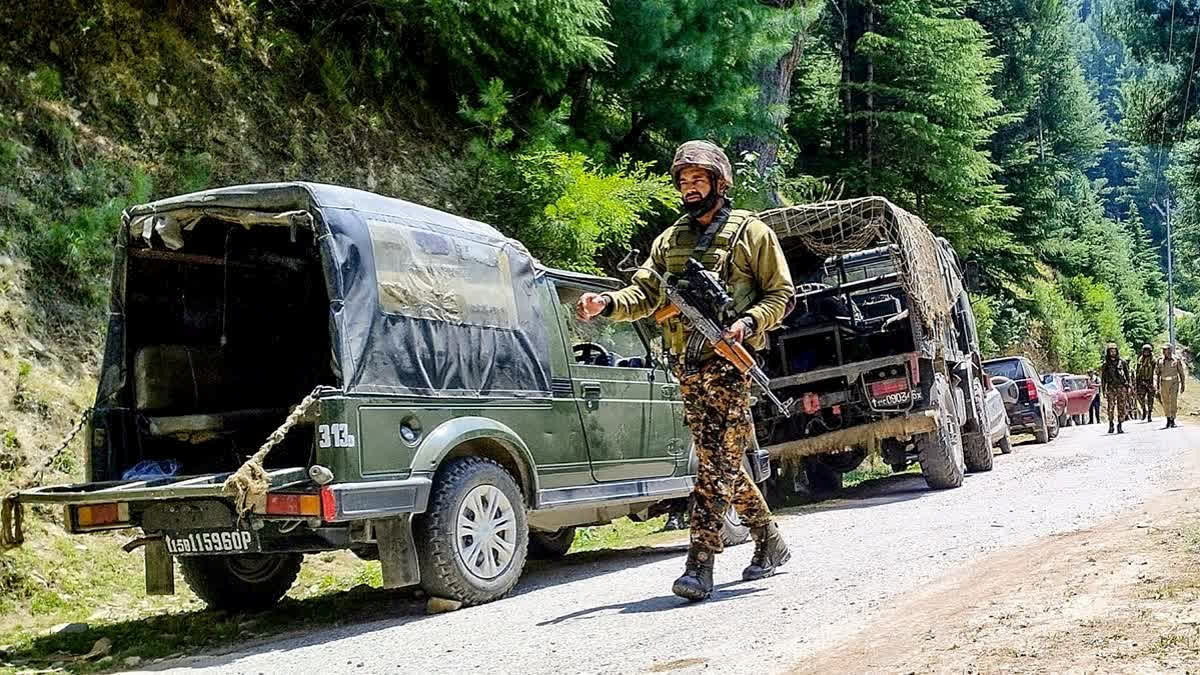Srinagar: Former Jammu and Kashmir Chief Minister and National Conference Vice President Omar Abdullah criticized the Modi-led National Democratic Alliance (NDA) government on Thursday following the United States' updated travel advisory, which warned its nationals against travelling to certain regions in India.
The US travel advisory, released on July 23, advises American citizens to avoid travelling to Manipur, Jammu and Kashmir, the India-Pakistan border, and parts of central and eastern India where Naxalite activity is prevalent.
Taking to X, formerly known as Twitter, Omar wrote, "So much for 'naya J&K.' Despite all the talk of normalcy, peace, tourism, and the G-20 spectacle in Srinagar, J&K continues to be the target of US State Department travel advisories."
Omar highlighted that the advisory cites "terrorist attacks" and "violent civil unrest," as well as "sporadic violence" between Indian and Pakistani forces along the Line of Control (LoC). He remarked, "The Modi government has been able to change nothing."

The advisory places Jammu and Kashmir, the India-Pakistan border, and regions in central and eastern India under 'Level 4' (Do Not Travel). The northeastern states, including Manipur, which has experienced ethnic clashes since May 2023, are categorized under 'Level 3' (Do Not Travel).
Overall India has been placed at Level 2. "Do not travel to: The union territory of Jammu and Kashmir (except the eastern Ladakh region and its capital, Leh) due to terrorism and civil unrest; within 10 km of the India-Pakistan border due to the potential for armed conflict; portions of Central and East India due to terrorism and Manipur due to violence and crime," said the US State Department.
In addition, it recommended Americans to reconsider travel to the northeastern states due to terrorism and violence. "Indian authorities report that rape is one of the fastest growing crimes in India. Violent crime, such as sexual assault, has happened at tourist sites and other locations. Terrorists may attack with little or no warning. They target tourist locations, transportation hubs, markets/shopping malls, and government facilities," the travel advisory said.
The US government has limited ability to provide emergency services to US citizens in rural areas. These areas stretch from eastern Maharashtra and northern Telangana through western West Bengal. The US government employees must get special authorization to travel to these areas, it said.
Placing Manipur at "Level 4: Do Not Travel", the State Department said: "Do not travel to Manipur due to the threat of violence and crime. Ongoing ethnic-based civil conflict has resulted in reports of extensive violence and community displacement. Attacks against Indian government targets occur on a regular basis. US government employees traveling in India require prior approval before visiting Manipur."
Similarly, terrorist attacks and violent civil unrest are possible in the union territory of Jammu and Kashmir. "Do not travel to this state (with the exception of visits to the eastern Ladakh region and its capital, Leh). Violence happens sporadically in this area and is common along the Line of Control (LOC) between India and Pakistan. It also occurs in tourist spots in the Kashmir Valley: Srinagar, Gulmarg, and Pahalgam. The Indian government does not allow foreign tourists to visit certain areas along the LOC, it said.
"India and Pakistan have a strong military presence on both sides of the border. The only official border crossing for non-citizens of India or Pakistan is in Punjab. It is between Attari, India, and Wagah, Pakistan. The border crossing is usually open, but check its current status before you travel. To enter Pakistan, you need a Pakistani visa. Only US citizens residing in India may apply for a Pakistani visa in India. Otherwise, apply for a Pakistani visa in your home country before traveling to India, it said.
Maoist extremist groups, or "Naxalites", are active in a large area of India that spans from eastern Maharashtra and northern Telangana through western West Bengal, the advisory said.
Attacks against officers of the Indian government continue to occur sporadically in the rural parts of Chhattisgarh and Jharkhand that border Telangana, Andhra Pradesh, Maharashtra, Madhya Pradesh, Uttar Pradesh, Bihar, West Bengal, and Odisha. Southwest areas of Odisha are also affected. The Naxalites have carried out many terrorist attacks, targeting local police, paramilitary forces, and government officials, it said.
"Due to the fluid nature of the threat, US government employees are required to obtain permission prior to traveling to most areas in the states of Bihar, Jharkhand, Chhattisgarh, West Bengal, Meghalaya, and Odisha. Permission is not required if employees are traveling only to the capital cities of these states. US government employees also need approval to travel to the eastern region of Maharashtra and the eastern region of Madhya Pradesh, the advisory said.
In addition, Northeastern States has been given - Level 3: Reconsider Travel. Ethnic insurgent groups occasionally commit acts of violence in parts of the northeast. These incidents include bombings of buses, trains, rail lines, and markets. There have been no recent reports of violence in Assam, Nagaland, Arunachal Pradesh, Mizoram, Sikkim, or Tripura, it said.
"US government employees traveling in India require prior approval before visiting the states of Sikkim, and Arunachal Pradesh, as well as when visiting any areas outside of the capital cities of Assam, Mizoram, Nagaland, Meghalaya, and Tripura, it said. (With agency inputs)



